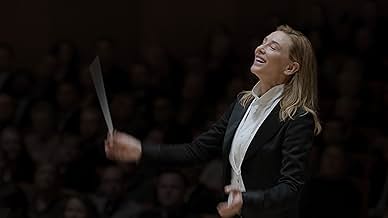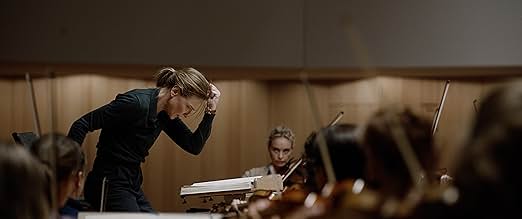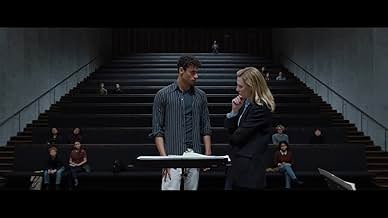Situado no mundo internacional da música clássica ocidental, o filme é centrado em Lydia Tár, amplamente considerada uma das maiores compositoras-regentes vivas e a primeira diretora musical... Ler tudoSituado no mundo internacional da música clássica ocidental, o filme é centrado em Lydia Tár, amplamente considerada uma das maiores compositoras-regentes vivas e a primeira diretora musical de uma grande orquestra alemã.Situado no mundo internacional da música clássica ocidental, o filme é centrado em Lydia Tár, amplamente considerada uma das maiores compositoras-regentes vivas e a primeira diretora musical de uma grande orquestra alemã.
- Direção
- Roteirista
- Artistas
- Indicado a 6 Oscars
- 79 vitórias e 271 indicações no total
Zethphan D. Smith-Gneist
- Max
- (as Zethphan Smith-Gneist)
Alec Baldwin
- Alec Baldwin
- (narração)
Avaliações em destaque
During the first minute of this film, Cate Blanchett shows what an extraordinary actress she is. Her character, star conductor Lydia Tár, is waiting to go onstage. There is no dialogue, only body language. But even without words, Blanchett shows what Tár thinks and feels.
Blanchett's remarkable performance is a large part of what makes this a good movie. But there's more. The very clever script gives us a lot to chew on afterards. Tár is a woman in the men-dominated world of classical music. She's not warm, empathic or even very sympathetic. In fact, she has many characteristics that are usually associated with men. She's vain, selfish and manipulative. And that's what gets her in trouble. At the start of the film, she seems to be one of the most admired women in the world. She is extremely famous and successful. At the end, everything has fallen apart.
The film doesn't judge. It leaves it up to the viewer to decide if Lydia Tár is a victim or a culprit. Or maybe both at the same time. The viewer gets a lot of information to make up his (or her) mind. Director Todd Field gives us the story elements slowly, bit by bit. Take the scene where Lydia Tár gives a stern speech to a young girl who bullies her daughter. It shows that she is used to getting everyone in line, according to her wishes. That's useful information to interpret things later on in the movie.
Tár is very much a modern movie. It has things to say about gender, about power, about social media, about being woke. But at the same time, it's a very old-fashioned movie. It takes its time. There are long scenes, and long takes. There's nothing modern in the way it is filmed. And that's a good thing.
Blanchett's remarkable performance is a large part of what makes this a good movie. But there's more. The very clever script gives us a lot to chew on afterards. Tár is a woman in the men-dominated world of classical music. She's not warm, empathic or even very sympathetic. In fact, she has many characteristics that are usually associated with men. She's vain, selfish and manipulative. And that's what gets her in trouble. At the start of the film, she seems to be one of the most admired women in the world. She is extremely famous and successful. At the end, everything has fallen apart.
The film doesn't judge. It leaves it up to the viewer to decide if Lydia Tár is a victim or a culprit. Or maybe both at the same time. The viewer gets a lot of information to make up his (or her) mind. Director Todd Field gives us the story elements slowly, bit by bit. Take the scene where Lydia Tár gives a stern speech to a young girl who bullies her daughter. It shows that she is used to getting everyone in line, according to her wishes. That's useful information to interpret things later on in the movie.
Tár is very much a modern movie. It has things to say about gender, about power, about social media, about being woke. But at the same time, it's a very old-fashioned movie. It takes its time. There are long scenes, and long takes. There's nothing modern in the way it is filmed. And that's a good thing.
It is not surprising that this film is tanking at the box office since it is much too long and slow paced for the average movie goer's attention span. Indeed parts of it, like the agonizingly protracted opening scene where a New Yorker magazine music critic interviews the title character about her classical music esthetics, seem designed by writer/director Tod Field as a boredom experiment wherein if you can survive it without running and screaming into the night out of sheer and utter ennui then you are worthy to see the rest of his "masterpiece".
Thing is, though, that a lot of this film does approach, if not encroach upon, masterpiece territory. Certain scenes, like Lydia Tar's bleak Staten Island homecoming where she summons the spirit of her mentor Leonard Bernstein in an effort to recapture the humanistic values she has lost, are genuinely heartbreaking. And the sequences that deal with Lydia's manipulation of her acolytes are difficult to watch as we see how artistic power feels even more corruptible, somehow, than the political kind, perhaps because it is a profanation of a purer space.
And I think we can all agree that Cate Blanchett is one helluva fine actor! As are Nina Hoss, Noemie Merlant and Sophie Kauer who play various of her entourage/victims.
Bottom line: For all its faults I have a sneaking suspicion that in twenty years they'll be watching this and not "The Fabelmans". Give it a B plus.
Thing is, though, that a lot of this film does approach, if not encroach upon, masterpiece territory. Certain scenes, like Lydia Tar's bleak Staten Island homecoming where she summons the spirit of her mentor Leonard Bernstein in an effort to recapture the humanistic values she has lost, are genuinely heartbreaking. And the sequences that deal with Lydia's manipulation of her acolytes are difficult to watch as we see how artistic power feels even more corruptible, somehow, than the political kind, perhaps because it is a profanation of a purer space.
And I think we can all agree that Cate Blanchett is one helluva fine actor! As are Nina Hoss, Noemie Merlant and Sophie Kauer who play various of her entourage/victims.
Bottom line: For all its faults I have a sneaking suspicion that in twenty years they'll be watching this and not "The Fabelmans". Give it a B plus.
If you are not familiar with classical music, probably almost the entire first hour will be very difficult to sit through. The dialogue is PACKED with references to classical music artists/works/history/etc. Not to mention there are constant little allusions to different plot threads which make up Tar's whole story.
However, this dies down gradually and the movie becomes much more focused and simple. Blanchett is incredible, but not in a showy way at all. Her conducting moments were awesome. The story is political and relevant, and handled very well and balanced-like.
There is a surprisingly creepy vibe to the film, that borders on something almost like a horror movie at times. It's quite unnerving.
One of the best movies i've seen all year! Probably Todd Field's best work yet.
However, this dies down gradually and the movie becomes much more focused and simple. Blanchett is incredible, but not in a showy way at all. Her conducting moments were awesome. The story is political and relevant, and handled very well and balanced-like.
There is a surprisingly creepy vibe to the film, that borders on something almost like a horror movie at times. It's quite unnerving.
One of the best movies i've seen all year! Probably Todd Field's best work yet.
'Tár', one of the most talked about films of 2022 and a serious contender for the Academy Awards, with six nominations, is written and directed by Todd Field - a filmmaker who does not seem at all rushed or prone to accumulate impressive numbers in his filmography. In fact 'Tár' is only his third feature film and it is made 16 years after the previous one. The fictional biography of a great musician - symphony orchestra conductor - 'Tár' seems and was written for Cate Blanchett and suits her to such an extent that after watching it it is hard to imagine another actress in this role. It's a complex and loooooong film (yes, that's its main problem!) which in almost three hours of projection manages to bring to the screen a multitude of problems related to the world of great musicians and the way they combine their careers with their personal lives, about the place of women in a competitive world where private lives are scrutinized and mistakes are not forgiven, about the role of media and social networks in celebrity careers, and about political correctness and its verdicts in the public square of the Internet age. Above all, however, it is a film about the power games in the fascinating and complicated world of great art.
The titular heroine of the film, Lydia Tár, seems to be a model of success in every way. A student of Leonard Berstein, she is one of the world's great conductors, winner of all possible awards, principal conductor of the Berlin Orchestra and professor at Julliard. She has, of course, had to work hard and fight fiercely for this position, as a woman and as a lesbian (her partner is the concertmaster of the orchestra), but the beginning of the film catches her at her peak and the past is not mentioned until it begins to insinuate in the present. Relationships with his daughter, an elementary school student, indicate traumas in the distant past. A conductor with whom she had a more recent relationship pursues her obsessively, and Lydia retaliates by blocking her artistic career. Her position of power seems to allow all but also requires her to make decisions that do not always seem completely professionally motivated. Sometimes it seems that she uses her power to fuel personal passions, but everything happens in an ambiguous zone. Her faithful assistant is skipped by her from a promotion, an instrumentalist in the orchestra is loses to a younger candidate the opportunity to perform a concert, in one of the lessons at Julliard she adopts a very politically incorrect attitude in a dialogue with a student. These are small and debatable incidents, but in all cases the decisions are hers alone. Perfectionism can be a great quality of a conductor who must have absolute control over every sound, tempo and nuance in a concert or recording. But life is more complicated, even than a Mahler symphony.
Director Todd Field seems to have drawn himself inspiration from his character, making some creative decisions that influence how the film looks. However, not all of them are for the benefit of the movie, some seemed questionable to me. The film begins with the credits that usually roll at the end, when the lights come up and the audience leaves the theater. It's a nice sign of respect for the technical team, but should this take precedence over the spectators in the cinema halls? The length of the film far exceeds that of Mahler's symphonies. Yes, this is the fashion in Hollywood, but here I feel that more brevity would have served the film. The first half hour seems like a docu-drama (an excellent one, by the way) about the life of a great musician, and another hour or so passes - spent in the stratosphere of the world of great musicians, in concert halls and luxurious apartments where the pianos don't even fill the spaces, until the drama really kicks off. Indeed, when events rush headlong, we are dealing with a genuine drama, which calls into question the entire world of intellectual and material luxury in which we had been immersed until then. The filming style also changes, from documentary style and long one-shots (see the Julliard scene) in the first part, to nervous editing with action film techniques. Neither the world of music with its intrigues and power games, nor that of the media and social media that can destroy lives and careers come out well in the story conceived by screenwriter Todd Field. The generosity in duration allows for the construction of several memorable roles - mostly feminine. I don't know if Cate Blanchett will get the Best Actress Academy Award this year again (it would be her third time), but her role seemed to me one of the best of a career in which I don't remember any failures or miscasts. I'd rather bet on the award for original script. We will see. In any case, 'Tár' is one of the most interesting films of the year, but also one of those that demands the attention and patience of the viewers. Using, again, the metaphor of Mahler's music, just as his symphonies are not liked by every classical music-loving audience, this film is not intended for every moviegoer. But those who like it, will like it a lot.
The titular heroine of the film, Lydia Tár, seems to be a model of success in every way. A student of Leonard Berstein, she is one of the world's great conductors, winner of all possible awards, principal conductor of the Berlin Orchestra and professor at Julliard. She has, of course, had to work hard and fight fiercely for this position, as a woman and as a lesbian (her partner is the concertmaster of the orchestra), but the beginning of the film catches her at her peak and the past is not mentioned until it begins to insinuate in the present. Relationships with his daughter, an elementary school student, indicate traumas in the distant past. A conductor with whom she had a more recent relationship pursues her obsessively, and Lydia retaliates by blocking her artistic career. Her position of power seems to allow all but also requires her to make decisions that do not always seem completely professionally motivated. Sometimes it seems that she uses her power to fuel personal passions, but everything happens in an ambiguous zone. Her faithful assistant is skipped by her from a promotion, an instrumentalist in the orchestra is loses to a younger candidate the opportunity to perform a concert, in one of the lessons at Julliard she adopts a very politically incorrect attitude in a dialogue with a student. These are small and debatable incidents, but in all cases the decisions are hers alone. Perfectionism can be a great quality of a conductor who must have absolute control over every sound, tempo and nuance in a concert or recording. But life is more complicated, even than a Mahler symphony.
Director Todd Field seems to have drawn himself inspiration from his character, making some creative decisions that influence how the film looks. However, not all of them are for the benefit of the movie, some seemed questionable to me. The film begins with the credits that usually roll at the end, when the lights come up and the audience leaves the theater. It's a nice sign of respect for the technical team, but should this take precedence over the spectators in the cinema halls? The length of the film far exceeds that of Mahler's symphonies. Yes, this is the fashion in Hollywood, but here I feel that more brevity would have served the film. The first half hour seems like a docu-drama (an excellent one, by the way) about the life of a great musician, and another hour or so passes - spent in the stratosphere of the world of great musicians, in concert halls and luxurious apartments where the pianos don't even fill the spaces, until the drama really kicks off. Indeed, when events rush headlong, we are dealing with a genuine drama, which calls into question the entire world of intellectual and material luxury in which we had been immersed until then. The filming style also changes, from documentary style and long one-shots (see the Julliard scene) in the first part, to nervous editing with action film techniques. Neither the world of music with its intrigues and power games, nor that of the media and social media that can destroy lives and careers come out well in the story conceived by screenwriter Todd Field. The generosity in duration allows for the construction of several memorable roles - mostly feminine. I don't know if Cate Blanchett will get the Best Actress Academy Award this year again (it would be her third time), but her role seemed to me one of the best of a career in which I don't remember any failures or miscasts. I'd rather bet on the award for original script. We will see. In any case, 'Tár' is one of the most interesting films of the year, but also one of those that demands the attention and patience of the viewers. Using, again, the metaphor of Mahler's music, just as his symphonies are not liked by every classical music-loving audience, this film is not intended for every moviegoer. But those who like it, will like it a lot.
Don't be fooled by the great reviews, if you're someone who's not particularly interested in orchestras, conductors and random old musicians from times past, this movie is an utter bore. The first 10 minutes are CREDITS. JUST CREDITS. Then it drags on with the most absolutely annoying, long, mind-numbing scenes where rich, white people just talk to each other about the most esoteric stuff, with cameos of the actress talking to her orchestra about which string needs to be pulled in which direction.
I'm dead serious, 1 and a half hour later, you still can't tell what the hell's going on. It's just scenes of her talking about the most mundane stuff, and playing instruments.
It's a pretentious movie, that appears completely different and way more interesting in the trailer, but in reality is just an elitist blob of nothingness aesthetic. If you value your money and time, don't watch this movie.
I'm dead serious, 1 and a half hour later, you still can't tell what the hell's going on. It's just scenes of her talking about the most mundane stuff, and playing instruments.
It's a pretentious movie, that appears completely different and way more interesting in the trailer, but in reality is just an elitist blob of nothingness aesthetic. If you value your money and time, don't watch this movie.
Você sabia?
- CuriosidadesProfessional cellist Sophie Kauer had no prior acting experience and auditioned at the encouragement of a friend. She learned to act by watching YouTube tutorials hosted by Michael Caine.
- Erros de gravaçãoWhen Lydia is talking to the two technicians after a rehearsal in Berlin, she requests they send her audio and video recordings, but the console in front of them in the booth is actually for controlling lights, not audio/video.
- Cenas durante ou pós-créditosThe opening credits presents the film crew and acknowledgments (usually shown at the end titles) without presenting the actors. The actors and soundtrack are shown at the ending without the crew.
- ConexõesEdited from A Bruxa de Blair (1999)
- Trilhas sonorasDas Wohltemperierte Klavier: Präludium and Fuge C-Dur, BWV 846
Written by Johann Sebastian Bach
Piano, Cate Blanchett
Principais escolhas
Faça login para avaliar e ver a lista de recomendações personalizadas
- How long is Tár?Fornecido pela Alexa
Detalhes
- Data de lançamento
- País de origem
- Centrais de atendimento oficiais
- Idiomas
- Também conhecido como
- Tar
- Locações de filme
- Dresden, Saxônia, Alemanha(Kulturpalast & Großen Garten Platz)
- Empresas de produção
- Consulte mais créditos da empresa na IMDbPro
Bilheteria
- Orçamento
- US$ 25.000.000 (estimativa)
- Faturamento bruto nos EUA e Canadá
- US$ 6.773.650
- Fim de semana de estreia nos EUA e Canadá
- US$ 158.620
- 9 de out. de 2022
- Faturamento bruto mundial
- US$ 29.177.163
- Tempo de duração2 horas 38 minutos
- Cor
- Mixagem de som
- Proporção
- 2.39 : 1
Contribua para esta página
Sugerir uma alteração ou adicionar conteúdo ausente



































